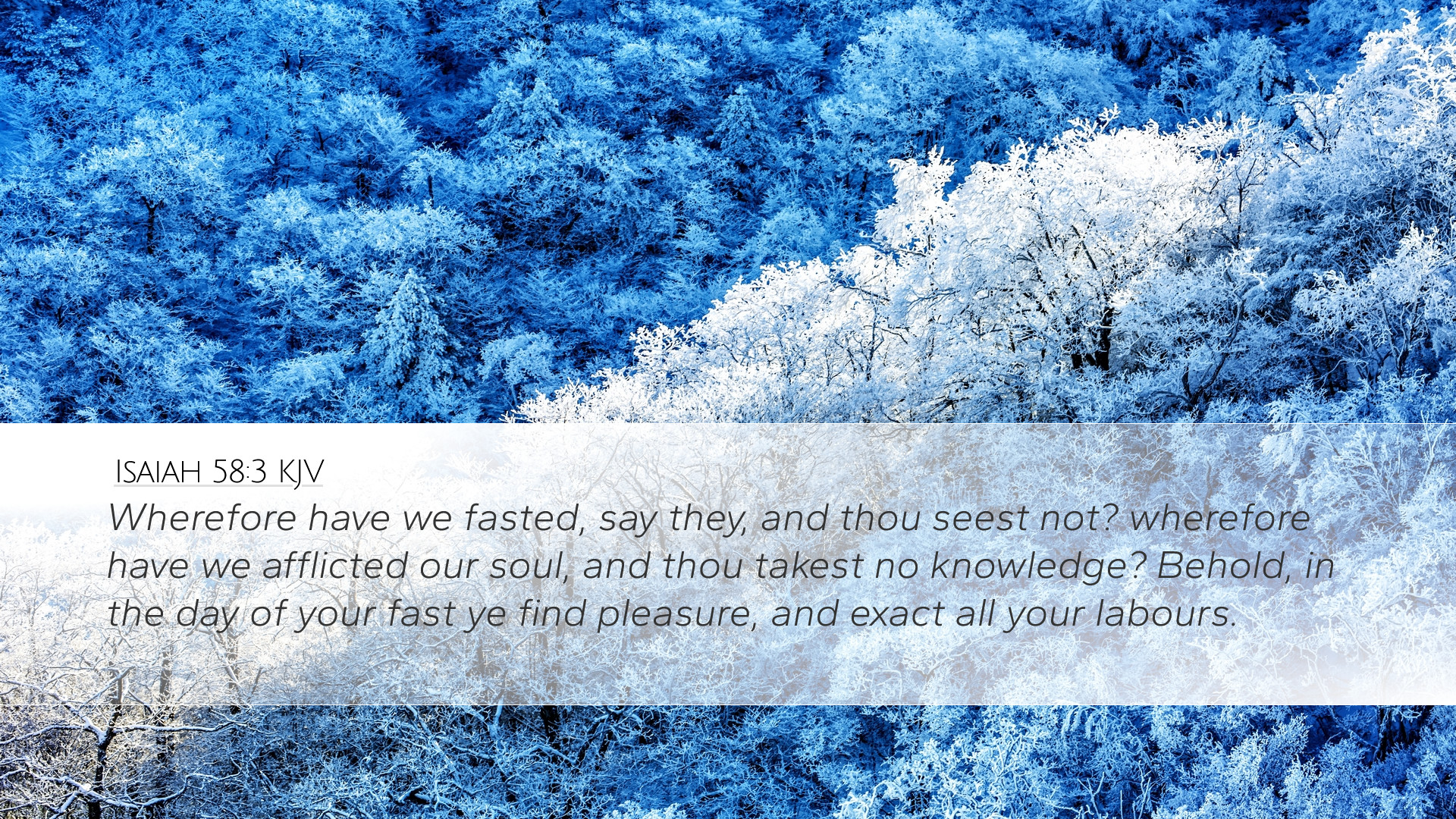Commentary on Isaiah 58:3
Isaiah 58:3 (KJV): "Wherefore have we fasted, say they, and thou seest not? wherefore have we afflicted our soul, and thou takest no knowledge? Behold, in the day of your fast ye find pleasure, and exact all your labours."
This verse strikes at the heart of true worship and the attitude within the worshipers. In this profound passage, the Lord reveals the insincerity of those who engage in religious acts without corresponding righteous behavior and intentions.
Contextual Background
The chapter of Isaiah 58 addresses the hypocrisy of Israel regarding fasting and genuine piety. The people of Israel are lamenting that their religious acts, particularly fasting, are not garnering the expected attention and approval from God. This indicates a fundamental misunderstanding of the nature of true worship and service.
Insight from Public Domain Commentaries
Matthew Henry’s Commentary
According to Matthew Henry, this passage illustrates the complaint of the people of Israel as they express their disillusionment with God’s silence during their times of fasting. They ask, “Wherefore have we fasted?” indicating their confusion regarding the effectiveness of their religious practices. Henry points out that their fasting has become a mere ritual devoid of sincerity and compassion. He emphasizes that merely abstaining from food is not enough; true fasting must also entail righteousness and charity.
Henry elaborates that God desires a fast that includes the liberation of the oppressed and kindness to others. The people were not experiencing God's acknowledgment because their hearts were not aligned with His will. Their actions were marked by self-indulgence and exploitation, undermining the very purpose of their pious practices.
Albert Barnes’ Notes on the Bible
Albert Barnes observes that the Israelites were engaging in fasts that were superficial at best. Their fasting was ritualistic; they questioned why God did not respond favorably, failing to recognize that their hearts were far from God. Barnes comments that God’s apparent indifference was a result of their sinful behaviors, stating: "They were as concerned for their own ease and comfort as ever, while fasting, which was intended to bring them low before God." He asserts that it is vital for believers to understand that God looks beyond the outward acts to the inner condition of the heart.
Moreover, Barnes emphasizes that the essence of fasting should lead to cleansing of sin and gentle treatment of the oppressed. He insists that expressions of sorrow and repentance must be accompanied by actions that reflect a change of heart and a commitment to social justice.
Adam Clarke’s Commentary
Adam Clarke identifies the hypocrisy evident in the fasts of the people. In his view, the verse reveals a critical distinction between the outward show of religion and genuine devotion. Clarke elucidates that when the Israelites appeal to God, they are exhibiting a lack of understanding about the requirements of true worship. He notes that their question, “wherefore have we fasted?” reveals their entitlement mentality, as if their mere acts of fasting should compel God to respond positively.
He reinforces the notion that true fasting, as defined by God, involves humility and a commitment to social justice. Clarke points out that the fast should not only be about abstaining from food but must translate into actions that reflect God’s heart towards the poor and needy. He indicates that this misconception led them to miss an essential aspect of their covenant relationship with the Lord.
Theological Implications
The theological implications of Isaiah 58:3 are profound and multifaceted. Central to the passage is the idea that outward religious practices must be accompanied by true piety and ethical behavior. God’s rebuke serves as a somber reminder of the failures of ritualistic worship that lacks corresponding acts of love and justice.
True Worship vs. Ritualism
True worship entails an alignment of heart and action. The fast that pleases God, as illustrated later in this chapter, involves acts of kindness, aiding the oppressed, and seeking justice. This demonstration of care is fundamental to a vibrant relationship with God, which cannot be achieved through mere traditions devoid of sincere intentions.
Societal Responsibility
Additionally, these verses compel believers to reflect on their societal responsibilities. The integration of faith and actions leads to communal restoration and manifests the radical nature of the gospel, which emphasizes love that extends beyond mere words to tangible deeds.
Practical Applications
- Self-Examination: Pastors and church leaders should encourage self-examination within congregations to ensure that acts of worship are not masked in hypocrisy.
- Educational Initiatives: Implement teaching series on social justice, emphasizing that true fasting and worship naturally lead to community care and support.
- Fasting as Discipleship: Frame fasting not just as a religious tradition, but as a discipline that calls believers to engage in acts of mercy and compassion.
- Community Engagement: Foster initiatives that allow congregations to work together in outreach programs that reflect the heart of God towards the marginalized.
Conclusion
Isaiah 58:3 serves as a clarion call for the church today. In an era where the lines between faith and social action can blur, this passage urges a return to the core of what it means to worship God in spirit and truth. The words of the prophets remind us that God’s favor is not earned through empty rituals but is bestowed upon those whose lives reflect His justice, mercy, and love. The sincere cry from the prophet encourages believers to engage in practices that foster authenticity and integrity of faith in their communities.


